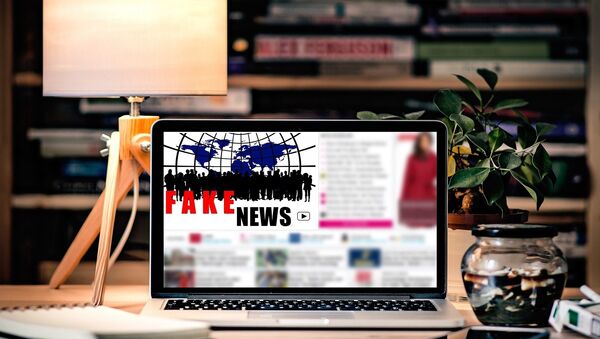Sputnik: Why does fake news go viral and why is it more likely to be shared than real news?
Dr. Philip Seargeant: I think the main thing is that it attracts attention and this is probably why fake news is likely to be shared than real stories because you can make them more attractive by making them more exaggerated and so forth. Any news story that attracts attention and is out of the ordinary is likely to be noted by readers and as I say, it's very easy, if you're making things up, to exaggerate that way — to draw the attention of people, especially on social media. Social media works by showing things that are out of the ordinary, everything that goes viral has to attract attention first and so forth. The other thing is that politics has become a lot more partisan recently, again, because of social media, and so again a story that feeds into your particular beliefs about someone or a particular event and, especially, can be used to attack the people you disagree with is very attractive.
READ MORE: With Hillary as President 'We are Looking at Nuclear War With Russia or China'
Sputnik: Who makes fake news? And what is the main motive?
Dr. Philip Seargeant: The term has come to cover such a broad variety of things now. Of course, some of it is purposefully done for propaganda, but some of it is done just for fun, people liking to troll people for the partisanship aspect because fake news, yes, some of it is completely fabricated, and some of it has an element of truth and plausibility but is so biased towards one particular opinion, that it corrupts the general media landscape.
Sputnik: How long has fake news been around? Was it around before social media and the Internet? We did have all these tabloids, was that fake news or is it a new phenomenon?
Sputnik: Politicians, as we've been talking about, some people say that despite them hating politicians, hating fake news, they are responsible for creating an environment in which the same fake news can actually flourish, do you agree with that? And can you explain your thoughts on that?
Dr. Philip Seargeant: I would tend to agree with that; I think that ultimately, the ethics of the people who have power, be it politicians, those who are in charge of social media companies, those running newspapers; if they take a strong ethical line on trying to be truthful then that creates the context for everything, it very much undermines everything, if people are worried about seeing fake news in their Twitter feed and their Facebook feed and they're checking it out, but at the same time the politicians and the people who have some power are telling blatant lies.
READ MORE: Trump Denies 'Fake News' Reports of Chaos in White House, Says Only Great Energy
Sputnik: So what can we do in this age that we live in to protect ourselves? First of all, how can we tell the difference between what's fake and what's real; how can we confirm that it's not just a fabricated story?
Dr. Philip Seargeant: The only real way to do that is to verify the story somehow and often by cross-referencing it, so if lots of news organization are reporting on it is more likely to be valid, if it's one story that just comes from one news organization, especially if you've not heard of that news organization, the chances are it's false, then also looking at the source, if someone you generally trust has some sort of general authority and so forth. The problem is I don't think people admittedly do that every time they read an article, the owners and the readers need to constantly be aware of the problem, which is why people are pushing for more regulations; more initiative either from the government or social media companies themselves.
Sputnik: Are they doing enough to stop the Facebook and the Twitter spread of fake news?
Dr. Philip Seargeant: Obviously not and people are talking, still complaining about it. I have worries that regulation can never really combat it and I think education is an important factor here, giving people an understanding of what the issues are, how they are consuming news and then they have awareness of how to make their own informed decisions.
The views and opinions expressed in this article are those of the author and do not necessarily reflect those of Sputnik.




